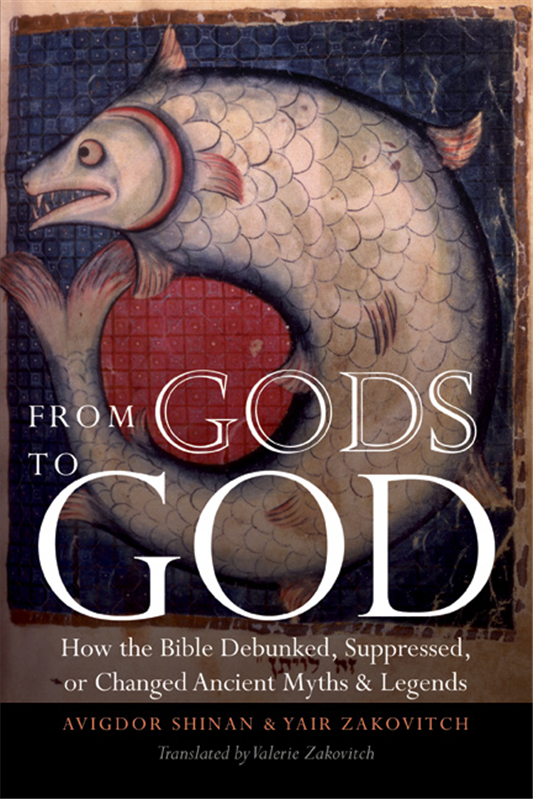From Gods to God, by Hebrew University professors Avigdor Shinan and Yair Zakovitch, is a collection of short studies on familiar tales from the Hebrew Scriptures, each of which asks an important question:[1] What is this story trying to hide? Delving into the Scriptural text with a method they call “literary archaeology,” Shinan and Zakovitch attempt to uncover earlier traditions that circulated orally as folk legends before the Scriptures took their final written forms.
To illustrate their methodology Shinan and Zakovitch focus in on the verse in the creation account in Genesis that notes, as if in passing, “And God created the huge sea monsters” (Gen. 1:21). By comparing the Genesis creation story to ancient Near Eastern myths, the authors of From Gods to God conclude that the writer of the Genesis creation account wished to suppress the mythological tradition that the creation of the world took place through a fierce battle between the gods, with the sea god and the sea monsters warring against the god of the heavens (variously identified as Marduk among the Babylonians or Baal among the Canaanites). In opposition to this mythical creation story the Genesis narrative presents a peaceful and orderly creation in which the One God brings all things, even the sea monsters, into being. Yet despite Scripture’s creation account, Shinan and Zakovitch show that vestiges of the more ancient pagan myths were still alive and well in ancient Israel. Allusions to the battle between the gods surface in prophetic and poetic portions of Scripture, as when we hear about God’s conquest of Leviathan. What is more, Shinan and Zakovitch demonstrate that these submerged traditions survived beyond the biblical period, only to resurface in post-biblical sources, sometimes from the Second Temple period, other times in much later rabbinic sources.
To uncover the traditions the Scriptures attempted to suppress Shinan and Zakovitch examine types of evidence including: 1) duplicate traditions elsewhere in the Scriptures, 2) parallel traditions from the pagan world, and 3) retellings of the tradition in post-biblical literature. They then assemble the evidence from these sources to reconstruct the traditions the writers of Scripture were responding to. Often they find the Scriptural version of a given story has attempted to demythologize the pagan/early tradition by turning gods into humans, to have downplayed the mighty deeds of Israel’s heroes by transferring the miraculous aspects of the story to God, or to have obscured racy details deemed inappropriate for sacred writings.
A question that arises from their “excavations” is why the writers of Scripture only sought to suppress the problematic traditions instead of deleting them entirely. The answer Shinan and Zakovitch give is that these traditions were too firmly rooted in Israel’s folk heritage to be rejected outright:
The writers of the Bible did not argue openly or directly with these unwanted traditions. …These writers presented a new or different version of a known story that did not openly oppose the views it disputed but, instead, interpreted them. The polemicist of this sort often finds himself between a rock and a hard place. On the one hand, if he wants his readers (who know the old version) to be willing to accept his rendition, he must reproduce faithfully, as much as possible, the popular tradition. On the other hand, he is committed to his beliefs and ideology, which require him to change the familiar tradition. The art of the biblical story can be found in the delicate balancing act performed by these writers, who tread carefully between the old and the new.[2]
Evidence for their view is found in the very persistence of these deeply rooted but problematic traditions long after the Scriptures had been written. The more ancient traditions crop up again in sources like the Dead Sea Scrolls, the New Testament, rabbinic midrash compilations and piyyutim (liturgical poems).
For readers of Jerusalem Perspective a key point of interest in this book will be how often the New Testament is a witness to the submerged traditions Shinan and Zakovitch examine. Just as important is how understanding these submerged traditions can illuminate aspects of the New Testament narratives. For instance, their excavation of the lost story of the birth of Moses reveals how closely the story of Jesus’ birth as told in the Gospel of Matthew parallels the traditions the authors of Exodus rejected:
Jesus’s birth story in the Gospel of Matthew is thus a prism in which are reflected traditions about Moses that were known to Matthew and that Matthew used in order to construct his story. Matthew…mined traditions from the biblical story and, primarily, from oral traditions that were known also to Flavius Josephus and the Rabbis. This fantastic story [i.e., about Moses’ birth—JP], as we said, did not win a place in the Pentateuch, where it left only vague imprints.[3]
A more subtle point readers of Jerusalem Perspective will appreciate is the implicit argument Shinan and Zakovitch make for the value of rabbinic literature for understanding the New Testament. Just because rabbinic sources are later (sometimes by many centuries) than the New Testament does not mean that they do not bear witness to traditions far more ancient than the compilations in which they are recorded. These later rabbinic sources can often illuminate a New Testament tradition that is only alluded to obliquely in the earlier texts. Rabbinic texts must not, of course, be used uncritically. But neither should facile arguments about the relative dates of the texts be an excuse for throwing the baby out with the bathwater.
Among the many stories Shinan and Zakovitch discuss in their book are the Tower of Babel, the manna in the wilderness, the golden calf, the slaying of Goliath, and the Queen of Sheba’s visit to King Solomon.
From Gods to God (approx. 300 pages; list price $27.95) is written in an accessible style for all biblically literate readers. Non-academic types will not be put off by endless footnotes, while scholarly readers will find that there is plenty to sink their teeth into. From Gods to God is an enjoyable read for anyone wishing to take a deeper look into stories from the Hebrew Scriptures.
- [1] Avigdor Shinan and Yair Zakovitch, From Gods to God: How the Bible Debunked, Suppressed, or Changed Ancient Myths and Legends (trans. Valerie Zakovitch; Philadelphia: Jewish Publication Society, 2012). ↩
- [2] Shinan and Zakovitch, From Gods to God, 7. ↩
- [3] Shinan and Zakovitch, From Gods to God, 170. ↩
































































































